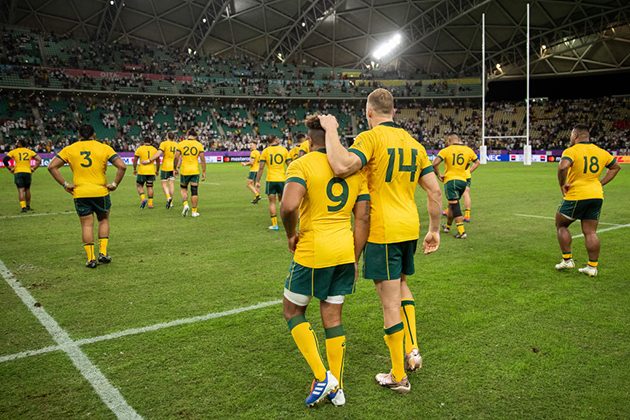Focusing on all-out attack can be at the detriment of results – as their World Cup quarter-final showed
Do Australia need a change in mindset?
Australia have a long tradition of playing a running game – probably why David Campese held the international try record for so long – but do they need to show a little more pragmatism going forward?
The Wallabies have always had a reputation as a ‘tournament side’ and of peaking for World Cups – they have reached four finals and won two – but their 2019 campaign ended at the quarter-final stage.
England saw them off comfortably in the last eight, winning 40-16 in Oita, but Australia’s tactics did not help their cause. They seemed reluctant to put boot to ball to clear pressure, even when in their 22, and more often than not chose to run it instead.
Related: England 40-16 Australia Match Report
In the face of England’s line speed in defence, this was not always the best option. Twice passes got picked off and resulted in tries – Henry Slade breaking from halfway to set up Jonny May’s second and Anthony Watson plucking a floated pass out of mid-air to run in from the 22m line.
Even when they did choose to kick, the Wallabies often opted for shorter chips rather than long clearances, and again this came back to bite them. Kurtley Beale’s chip from his 22 fell into the arms of Jonny May, who then launched a counter-attack that saw England get to within six metres of the Australia line.
When you have 64% possession, 62% territory and make twice as many metres as your opponents (568 to 273), you should be in with a decent chance of winning. But Australia were pretty much out of the quarter-final contest at the hour mark.
The glaring figure from the post-match statistics is that Australia conceded 18 turnovers – the attacking mentality too regularly resulting in forced passes or players becoming isolated.
Yet Wallabies coach Michael Cheika bristled at the suggestion they had got their tactics wrong. “No, I don’t think so at all…,” he said post-match. “We gave away two intercepts. They hurt. That is the way we play footy. I am not going to a kick-and-defend game.
“Call me naive but that’s not what I am doing. I would rather win playing our way, that’s the way Aussies want us to play.”
Surely, you would rather win full stop? Had Australia shown a little more pragmatism – gone for three points rather than a scrum from a penalty in front of the posts with 25 minutes to go for example – they could have made the quarter-final more of a contest.

Evasion tactics: Kurtley Beale takes on England’s defence (Getty Images)
The attacking mindset is certainly good to watch and they have players who can excite and exhilarate crowds. Marika Koroibete and Beale are just two dangerous runners in the Wallabies’ back-line while teenager Jordan Petaia looks likely to be a threat in international rugby for the next decade.
However, rugby is about balance, about being able to use the rapier and the bludgeon in different circumstances. A refusal to consider widening the remit of a team, to mix long kicks with neat flicks as one example, can be detrimental.
Australian rugby does face a lot of competition from other sports – league, Aussie Rules, cricket – and that is one of the reasons the Wallabies have long adopted that all-out attack mentality. The theory goes that you need to play entertaining rugby to attract fans and it does help. But winning rugby is surely the biggest draw?
Whether Australia change their philosophy as they start the rebuilding process for France 2023 we will have to wait and see. What we do know is Cheika will not be overseeing that process because he has quit as Wallabies coach.
Keep track of events in Japan via our Rugby World Cup homepage.
Follow Rugby World magazine on Facebook, Instagram and Twitter.





